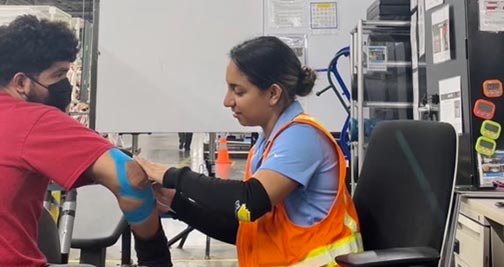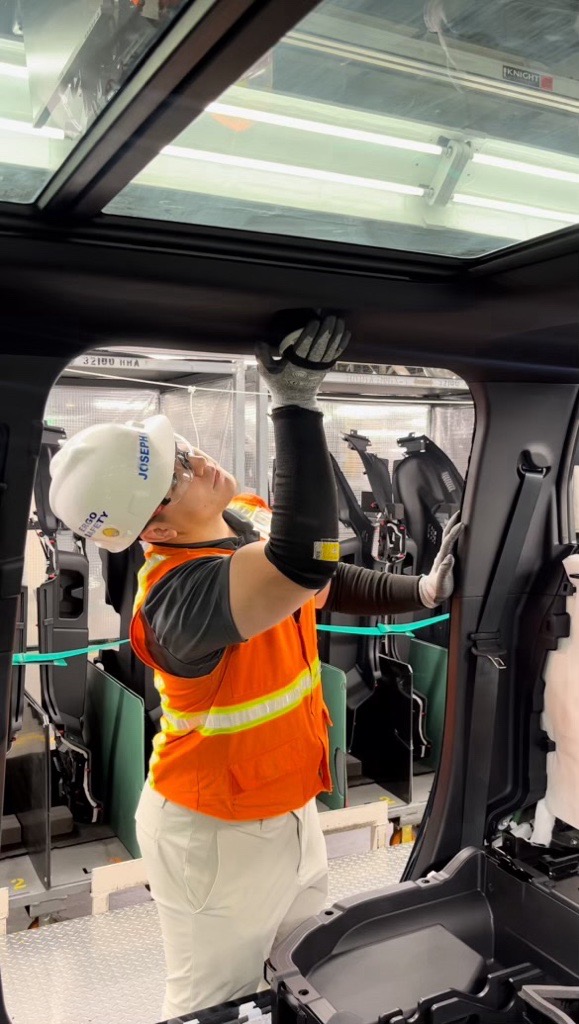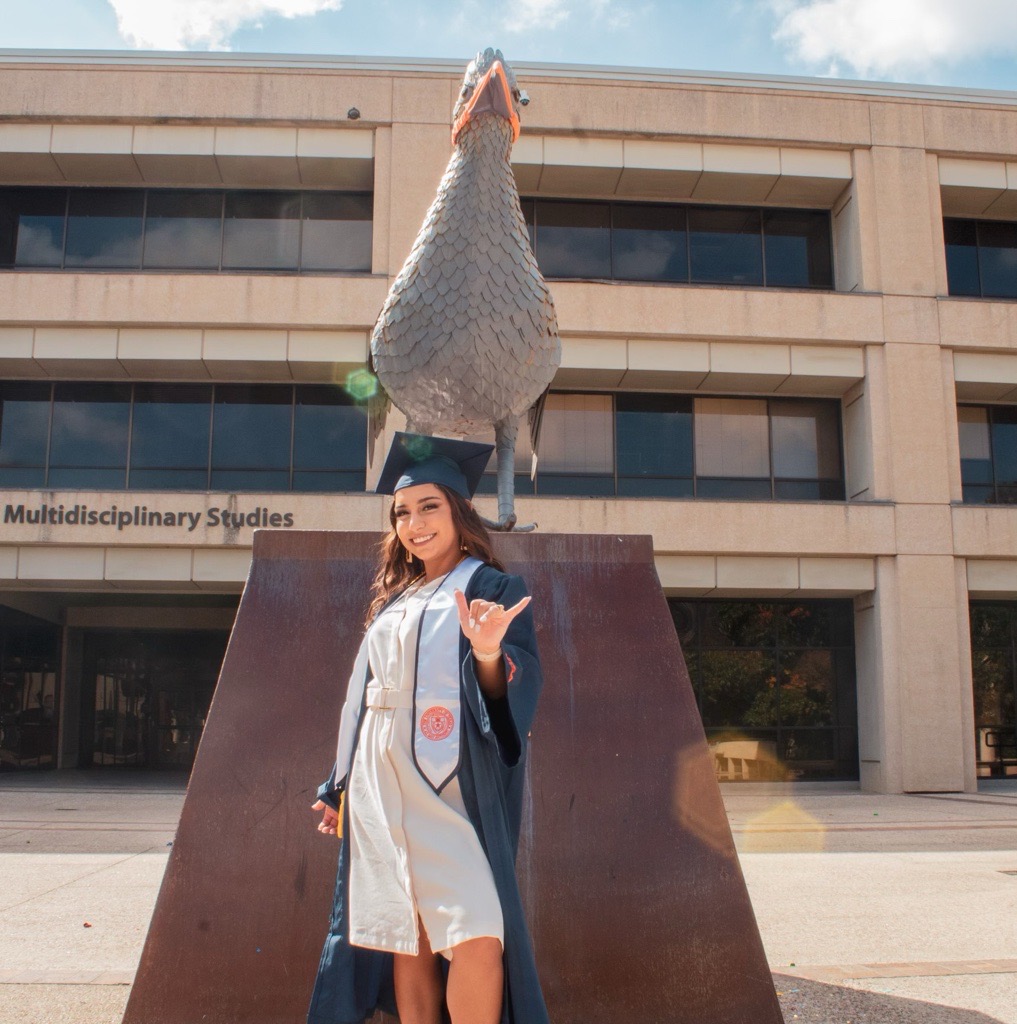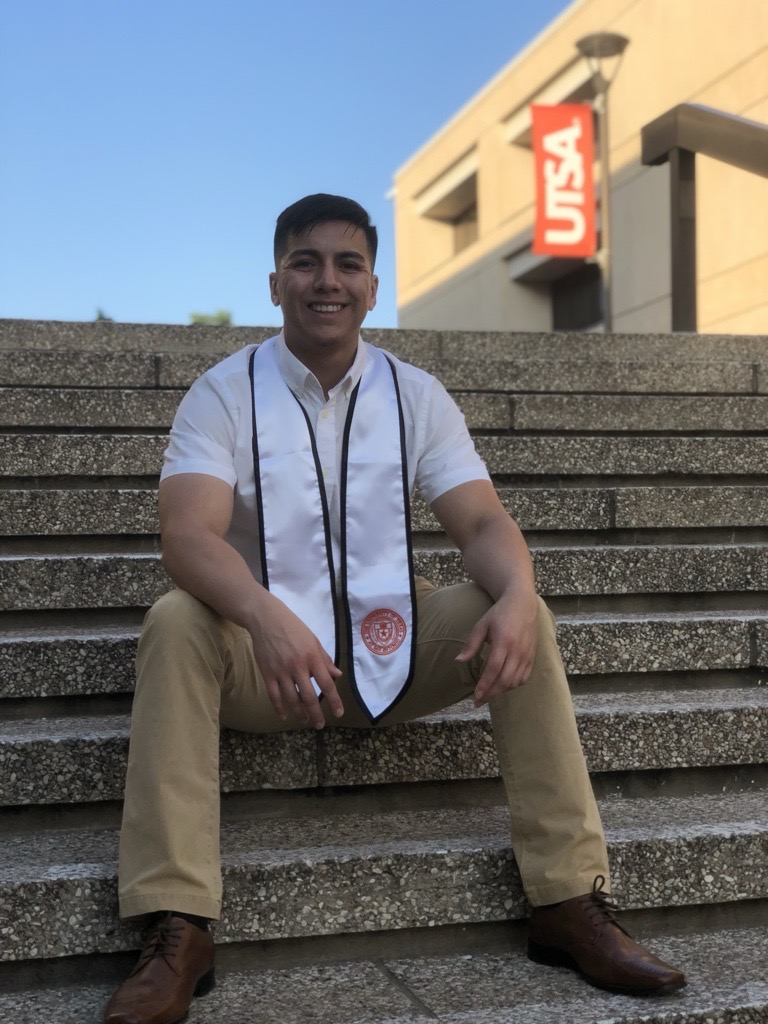Posted on May 28, 2024 by Amanda Cerreto

Valeria Zavala applies KT tape to an automotive worker's arm
Two graduates from the UTSA Department of Kinesiology have found careers in a seemingly unlikely place: a vehicle manufacturing plant.
 Joseph Castillo ’19 and Valeria Zavala ’20 are putting their bachelor’s degrees in kinesiology to practical use for Premise Health at a local vehicle manufacturing plant in South San Antonio, Texas. Castillo, an ergonomics supervisor, and Zavala, an injury prevention specialist, are caring for the more than 2,600 team members who produce and assemble two large types of vehicles.
Joseph Castillo ’19 and Valeria Zavala ’20 are putting their bachelor’s degrees in kinesiology to practical use for Premise Health at a local vehicle manufacturing plant in South San Antonio, Texas. Castillo, an ergonomics supervisor, and Zavala, an injury prevention specialist, are caring for the more than 2,600 team members who produce and assemble two large types of vehicles.
Both students previously had alternate plans. Castillo originally wanted to be a lawyer, while Zavala thought of perhaps dentistry or another aspect of health care. However, both decided to pursue kinesiology for the same reason: the degrees were adaptable and practical.
“A kinesiology degree is so flexible,” said Castillo, a first-generation student who hails from Temple, Texas. “I was able to specialize in a lot of areas and get to do stuff in the classroom as an undergrad that I otherwise might have had to wait for med school to do.”
Zavala, a first-generation student from Eagle Pass, Texas, knew that no matter where she landed, she wanted to help people.
“If I am blessed enough to be healthy, I want to help the people that need my help,” she said.
Speaking with Castillo and Zavala reveals how important their degrees are to a global automotive company. The manufacturing facility has its own health center on site that offers a full range of services, including a pharmacy, primary health care and dental care.
Zavala has been with Premise Health for nearly three years and works line side of assembly lines inside the manufacturing facility. As an injury prevention specialist, she is responsible for tasks such as performing physical demand analysis, developing and leading group and individual preventative care plans and performing injury/musculoskeletal screenings and assessments.
“This job has built my confidence,” she said. “Working with what we call ‘industrial athletes’ is a different kind of challenge. I had to learn all the terms they use and how they handle the tools and parts so I could help deviate risks.”
 Castillo, like Zavala, began as an injury prevention specialist for Premise Health. After a few months, he moved to its ergonomics line of service, which provides ergonomic solutions like process redesign, workstation modifications, weights and force reduction.
Castillo, like Zavala, began as an injury prevention specialist for Premise Health. After a few months, he moved to its ergonomics line of service, which provides ergonomic solutions like process redesign, workstation modifications, weights and force reduction.
“That’s how I use my degree every day, seeing the body and seeing how a certain weight or height of a person could make them more at risk to develop back injuries or other hazards,” Castillo said.
If a team member does get injured, Castillo and his team evaluate the process for ways to lessen future risks.
“Are there too many people at that one spot? Is there a workaround to lighten the burden on one person? Do we need to evaluate the hand tools?” he said.
Both roles involve collaboration and critical thinking. Each day is different.
“It’s really cool to see people working at a fast pace like this, because you can identify major issues and how certain movements may be causing certain injuries,” Zavala said. “When you work with the average athlete, it may be easier to pinpoint issues.”
 While Zavala was at UTSA, she was a member of the student-run Womxn in Medicine. This group was another huge help in developing her skills. They had the opportunity to visit a cadaver lab in New Braunfels, Texas to examine a body that had been donated to science.
While Zavala was at UTSA, she was a member of the student-run Womxn in Medicine. This group was another huge help in developing her skills. They had the opportunity to visit a cadaver lab in New Braunfels, Texas to examine a body that had been donated to science.
“I had just taken a lesson on heart anatomy that week,” Zavala recalled, “and seeing the organs and tendons up close was so helpful. I was able to identify all the parts of the heart that I learned from textbooks in real-life.”
Both Castillo and Zavala are grateful to UTSA for preparing them for their demanding jobs. They can pinpoint specific classes that taught them the skills they use daily, such as creating injury plans, collaborating across departments and more.
“Evaluation of Athletic Injuries is a class I would recall every day when I was an injury prevention specialist,” Castillo said, “along with Biomechanics in my current role. I need to know the way the body moves, how it takes on loads, anthropometrics, things like that.”
Zavala references her Therapy Modalities course often in her daily work.
“That course had so many different tools in the classroom, and when I came to Premise, I remembered using it in class,” she said. “If I had not taken that class, I would have definitely struggled learning how to apply all of these tools to my daily work.”
Although their paths are much different now than what they had imagined as first-year students, both UTSA alumni are happy with their careers and the way they are applying their degrees in a useful, helpful way.
“My favorite part about my job is the satisfaction I get from developing and implementing a counter-measure,” Castillo said. “It’s not a quick process and involves a lot of collaboration between our production team and engineering groups. After a few weeks, to follow up with the team member and hear that our work is helping relieve discomfort or improving their work flow, that is so important for me.”
Zavala adds, “Building trust with my department has been great, and they’re willing to let me implement plans to help their injuries. Having that freedom to approach each person individually in a way that’s most helpful for them makes me really appreciative.”

